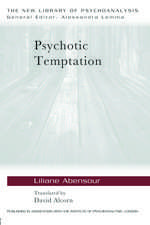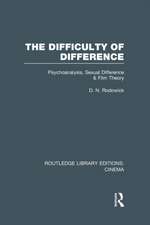Projective Identification: The Fate of a Concept: The New Library of Psychoanalysis
Editat de Elizabeth Spillius, Edna O'Shaughnessyen Limba Engleză Hardback – 26 oct 2011
The authors believe that this unusually widespread interest in a particular concept and its varied ‘fate’ has occurred not only because of beliefs about its clinical usefulness in the psychoanalytic setting but also because projective identification is a universal aspect of human interaction and communication.
Projective Identification: The Fate of a Concept will appeal to any psychoanalyst or psychotherapist who uses the ideas of transference and counter-transference, as well as to academics wanting further insight into the evolution of this concept as it moves between different cultures and countries.
| Toate formatele și edițiile | Preț | Express |
|---|---|---|
| Paperback (1) | 333.73 lei 3-5 săpt. | +29.16 lei 6-10 zile |
| Taylor & Francis – 26 oct 2011 | 333.73 lei 3-5 săpt. | +29.16 lei 6-10 zile |
| Hardback (1) | 975.36 lei 6-8 săpt. | |
| Taylor & Francis – 26 oct 2011 | 975.36 lei 6-8 săpt. |
Din seria The New Library of Psychoanalysis
- 5%
 Preț: 294.01 lei
Preț: 294.01 lei - 5%
 Preț: 266.39 lei
Preț: 266.39 lei - 5%
 Preț: 264.13 lei
Preț: 264.13 lei - 5%
 Preț: 295.02 lei
Preț: 295.02 lei - 5%
 Preț: 298.13 lei
Preț: 298.13 lei - 5%
 Preț: 260.93 lei
Preț: 260.93 lei - 5%
 Preț: 294.02 lei
Preț: 294.02 lei - 5%
 Preț: 233.05 lei
Preț: 233.05 lei -
 Preț: 334.52 lei
Preț: 334.52 lei - 5%
 Preț: 349.43 lei
Preț: 349.43 lei -
 Preț: 310.43 lei
Preț: 310.43 lei - 5%
 Preț: 282.40 lei
Preț: 282.40 lei - 5%
 Preț: 250.36 lei
Preț: 250.36 lei - 5%
 Preț: 333.73 lei
Preț: 333.73 lei -
 Preț: 347.67 lei
Preț: 347.67 lei - 5%
 Preț: 233.57 lei
Preț: 233.57 lei - 5%
 Preț: 235.66 lei
Preț: 235.66 lei - 5%
 Preț: 253.71 lei
Preț: 253.71 lei - 5%
 Preț: 219.54 lei
Preț: 219.54 lei - 5%
 Preț: 295.41 lei
Preț: 295.41 lei - 5%
 Preț: 316.84 lei
Preț: 316.84 lei -
 Preț: 309.55 lei
Preț: 309.55 lei -
 Preț: 309.79 lei
Preț: 309.79 lei - 5%
 Preț: 294.71 lei
Preț: 294.71 lei - 5%
 Preț: 345.73 lei
Preț: 345.73 lei - 5%
 Preț: 280.39 lei
Preț: 280.39 lei - 5%
 Preț: 295.41 lei
Preț: 295.41 lei - 5%
 Preț: 286.68 lei
Preț: 286.68 lei -
 Preț: 336.84 lei
Preț: 336.84 lei - 5%
 Preț: 233.65 lei
Preț: 233.65 lei - 5%
 Preț: 762.85 lei
Preț: 762.85 lei - 5%
 Preț: 296.08 lei
Preț: 296.08 lei - 5%
 Preț: 260.72 lei
Preț: 260.72 lei - 5%
 Preț: 234.44 lei
Preț: 234.44 lei - 5%
 Preț: 235.45 lei
Preț: 235.45 lei - 5%
 Preț: 218.26 lei
Preț: 218.26 lei - 5%
 Preț: 231.82 lei
Preț: 231.82 lei - 5%
 Preț: 331.64 lei
Preț: 331.64 lei - 5%
 Preț: 273.04 lei
Preț: 273.04 lei - 5%
 Preț: 284.59 lei
Preț: 284.59 lei - 5%
 Preț: 280.73 lei
Preț: 280.73 lei - 18%
 Preț: 811.99 lei
Preț: 811.99 lei - 17%
 Preț: 246.34 lei
Preț: 246.34 lei - 5%
 Preț: 361.48 lei
Preț: 361.48 lei - 5%
 Preț: 365.10 lei
Preț: 365.10 lei - 10%
 Preț: 280.14 lei
Preț: 280.14 lei - 11%
 Preț: 278.48 lei
Preț: 278.48 lei - 5%
 Preț: 365.37 lei
Preț: 365.37 lei - 5%
 Preț: 360.84 lei
Preț: 360.84 lei - 5%
 Preț: 379.23 lei
Preț: 379.23 lei
Preț: 975.36 lei
Preț vechi: 1026.69 lei
-5% Nou
Puncte Express: 1463
Preț estimativ în valută:
186.75€ • 191.56$ • 157.23£
186.75€ • 191.56$ • 157.23£
Carte tipărită la comandă
Livrare economică 26 februarie-12 martie
Preluare comenzi: 021 569.72.76
Specificații
ISBN-13: 9780415605281
ISBN-10: 0415605288
Pagini: 432
Dimensiuni: 156 x 234 mm
Greutate: 0.78 kg
Ediția:New.
Editura: Taylor & Francis
Colecția Routledge
Seria The New Library of Psychoanalysis
Locul publicării:Oxford, United Kingdom
ISBN-10: 0415605288
Pagini: 432
Dimensiuni: 156 x 234 mm
Greutate: 0.78 kg
Ediția:New.
Editura: Taylor & Francis
Colecția Routledge
Seria The New Library of Psychoanalysis
Locul publicării:Oxford, United Kingdom
Public țintă
Postgraduate, Professional, and Professional Practice & DevelopmentCuprins
Spillius, O'Shaughnessy, Foreword. Part I: Melanie Klein's Work. Spillius, The Emergence of Klein's Idea of Projective Identification in Her Published and Unpublished Work. Klein, Notes on Some Schizoid Mechanisms. Part II: Some British Kleinian Developments. Spillius, Developments by British Kleinian Analysts. Bion, Attacks on Linking. Rosenfeld, Contribution to the Psychopathology of Psychotic States: The Importance of Projective Identification in the Ego Structure and the Object Relations of the Psychotic Patient. Joseph, Projective Identification: Some Clinical Aspects. Feldman, Projective Identification: The Analyst's Involvement. Sodré, Who’s Who? Notes on Pathological Identifications. Part III: The Plural Psychoanalytic Scene. Spillius, O'Shaughnessy, Introduction. The British Psychoanalytic Society. O'Shaughnessy, The Views of Contemporary Freudians and Independents about the Concept of Projective Identification. Sandler, The Concept of Projective Identification. Continental Europe. Spillius, Introduction. Hinz, Projective Identification: The Fate of the Concept in Germany. Canestri, Projective Identification: The Fate of the Concept in Italy and Spain. Quinodoz, Projective Identification in Contemporary French-Language Psychoanalysis. The United States. Spillius, Introduction. Schafer, Projective Identification in the USA: An Overview. Spillius, A Brief Review of Projective Identification in American Psychoanalytic Literature. Malin, Grotstein, Projective Identification in the Therapeutic Process. Ogden, On Projective Identification. Mason, Vicissitudes of Projective Identification. Latin America. Meyer, Introduction. Jarast, Projective Identification: Projections in Argentina. Massi, Projective Identification: Brazilian Variations of the Concept. Jordan-Moore, Projective Identification and the Weight of Intersubjectivity. Spillius, O'Shaughnessy, Afterword.
Notă biografică
Elizabeth Spillius studied general psychology at the University of Toronto (1945), social anthropology at the University of Chicago, The London School of Economics and The Tavistock Institute of Human Relations (1945-1957) and psychoanalysis at the Institute of Psychoanalysis in London (1956 to the present). Her main writings have been Family and Social Network (1957, writing as Elizabeth Bott), Tongan Society at the Time of Captain Cook's Visits (1982), Melanie Klein Today (1988) and Encounters with Melanie Klein (2007)
Edna O'Shaughnessy came to psychoanalysis from philosophy. She trained first as a Child Psychotherapist at the Tavistock Clinic in the 1950s, and then in the 1960s, she trained at the British Psychoanalytical Society, of which she is a training and supervising analyst and also a child analyst. Her many published papers are written from both a clinical and a conceptual perspective
Edna O'Shaughnessy came to psychoanalysis from philosophy. She trained first as a Child Psychotherapist at the Tavistock Clinic in the 1950s, and then in the 1960s, she trained at the British Psychoanalytical Society, of which she is a training and supervising analyst and also a child analyst. Her many published papers are written from both a clinical and a conceptual perspective























